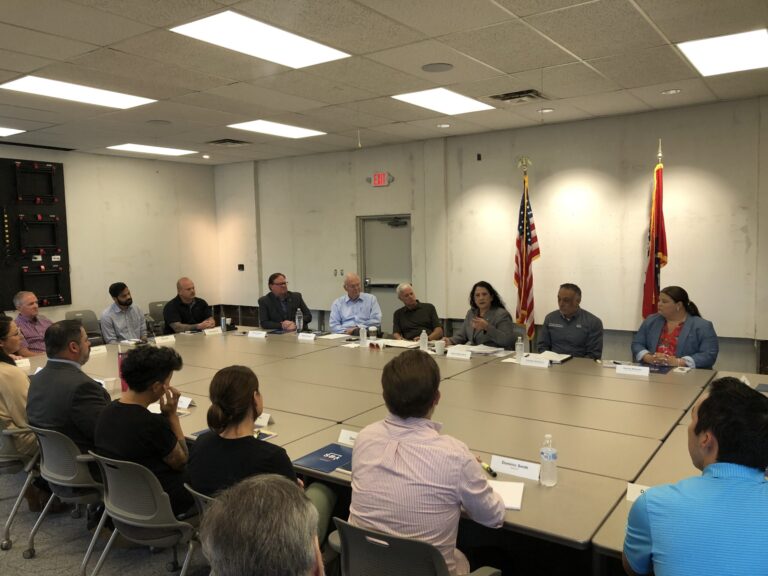When Daniel Sanchez’s family learned of the tornado damage to their small business in May, he said it was the first time he had seen his father cry.
“It really hurts, all the hard work he put in,” Sanchez said.
Tortilleria La Popular — a tortilla factory, bakery and restaurant — has been a staple in Rogers for 16 years. But severe weather over Memorial Day weekend shut down operations after the family lost supplies and equipment was damaged by rain leaking through a damaged roof.
Sanchez said starting a small business was the “American dream” and they worked hard to make it happen.
“Seeing what they went through was devastating for them, but we are a family of faith, and we believe that everything happens for a reason and we know that God has a plan for us,” she said.
The Sanchez family was part of a group of about a dozen Northwest Arkansas business owners who participated in a roundtable discussion Thursday at the Rogers-Lowell Chamber of Commerce with U.S. Small Business Administration Administrator Isabel Casillas Guzman, who was spending the day in the area at the request of U.S. Rep. Steve Womack.
“The SBA needs to be there for the long term, and we will be,” Guzman said.
The United States recorded a record 28 more $1 billion-plus natural disasters last year, breaking the previous record of 22 that occurred about two years earlier, Guzman said. In the 1980s, disasters of that scale occurred every four months; now they occur every few weeks, he said.
As a result of President Joe Biden’s decision executive order To transform the federal customer experience, Guzman said the SBA has worked to streamline its services, in part by investing heavily in technology. It used to take 100 days to process a loan application. Now it’s 12 days and sometimes 24 to 48 hours if the application is simple and smaller, he said.
After Biden approved declaration of major disaster On May 31, the SBA began offering low-interest federal disaster loans to Arkansans affected by more than a dozen tornadoes and several hurricanes. Businesses and nonprofits can borrow up to $2 million to help repair or replace damaged real estate, equipment, inventory and other business assets.

The SBA also offers Economic Injury Disaster Loans to help meet working capital needs caused by a disaster. Disaster loans of up to $500,000 are available to homeowners to help repair or replace damaged or destroyed property. Homeowners and renters can borrow up to $100,000 for personal property, including vehicles.
To date, the SBA has received 534 applications and approved 156 worth nearly $13 million, agency officials said Thursday. The SBA is seeing an approval rate of more than 60%, which Guzman described as “a good performance.”
While business owners at Thursday’s discussion said the SBA’s assistance was much-needed, they also noted they face a number of challenges in starting over.
Ozark Axe House owner Patrick Stewart lost everything when the building that housed his downtown Rogers business was completely destroyed by a tornado in May. Rising costs for materials and rent will make it difficult to find something comparable, he said.
“I think the hardest part is that compared to three, four, five years ago when someone started a business, you’re never going to be able to match the results you were getting back then,” he said.
Womack, who served as mayor of Rogers for 12 years before being elected to Congress, said that while the initial cost of construction was not cheap, the “economic vitality” driving widespread growth in Northwest Arkansas has resulted in increased costs.
“This just puts an additional burden on these small businesses, and as these tenants have said, there is simply no space available for many of these businesses to be able to move into,” Womack said.

As Arkansans continue to work toward recovery, Guzman said he is proud the SBA program has transformed to increase restrictions and ensure a 12-month period of no interest accrued and loans deferred “so businesses and individuals can recover.”
Additionally, he said the deadline for physical disaster assistance has been extended to August 28 and the deadline for economic loss loans is not until next March.
“Our small businesses have been incredibly resilient over the last few years having weathered and navigated COVID and the disruptions and now facing a natural disaster,” he said. “We’ve seen improvements across the country over the last few years and we want those small businesses to use our free consulting network, use all of the SBA products to help them find their way forward.”
GET THE MORNING’S HEADLINES DELIVERED TO YOUR INBOX


